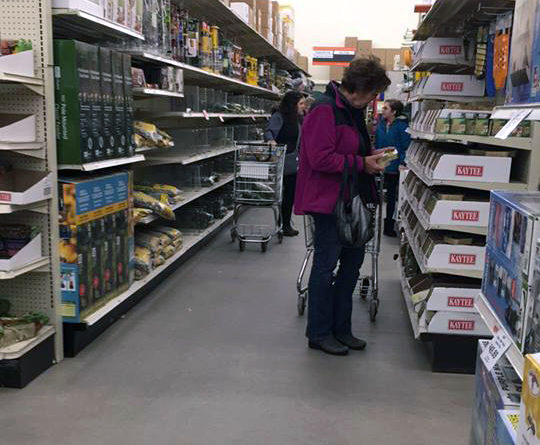With green space hidden under snow, locals rush to feed birds
By Brandi Makuski
Spring birds are at risk of dying in large numbers, thanks to a late severe snowstorm that the Portage Co. area struck over the weekend.
Kent Hall, a retired professor of biology at UWSP and coordinator for the local Audubon Society, said the local bird population has swelled thanks to the weather—unfortunately, many of those birds feast on bugs and worms, which right now are nowhere in sight.
“Unfortunately, this is the time of year birds migrate through the area, but they were blocked by the snow,” Hall said by phone on Wednesday. “I’ve seen two yellow-bellied sapsuckers in the past 46 years until a few days ago; we had five at one time in the yard.”
Hall said because of the snow cover, birds have to rely on meal-worm or suet in feeders hung from trees or porches, makeshift feeders created from a dry birdbath, or seed sprinkled on a patch of shoveled sidewalk.
“Anyone who can help feed the birds, that would be a good thing,” Hall added.
That could be tricky. Local retailers say they’re selling out of bird food quickly. Fleet Farm on Hwy. 10 East in Stevens Point was sold out of most bird food on Wednesday; an employee there did not immediately know when more stock would be available.
Jay-Mar, Inc. of Plover is in a similar spot.
“It’s been a little crazy here at Jay-Mar the past few days,” said Lisa Hahn, manager for the store located at 2130 Jay Mar Rd. “Our customers are very concerned, especially about the robins. They’ve been coming in to buy meal-worms, dried fruit and things.”
Hahn said the has completely sold out of meal-worm, “just like, I think, everybody else in town,” and wasn’t immediately sure when they’d be restocked.
Haahn said robins aren’t likely to use feeders, so she suggests sprinkling bird seed or suet on clear patches of the ground.
Hall said said other birds, like the yellow-bellied sapsuckers, typical do use feeders and rely on sunflower and other assorted seeds. But he’s concerned the situation may become a drastic one for birds.
“We could be seeing hundreds of thousands of birds die,” he said.

